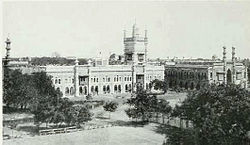- Chepauk Palace
-
Chepauk Palace was the official residence of the Nawab of Arcot from 1768 to 1855. It is situated in the neighbourhood of Chepauk in Chennai, India and is constructed in the Indo-Saracenic style of architecture.
History
By the end of the Carnatic Wars, the previously independent kingdom of the Carnatic had virtually become a protectorate of the British East India Company. The Nawab Muhammed Ali Khan Wallajah was a close friend and ally of the British and was dependent on Company troops for his protection. So, in 1764, he thought of constructing a palace for himself within the ramparts of Fort St George.[1] However, due to space constraints, Wallajah was forced to abandon his plans and instead constructed a palace at Chepauk, a few miles to the south of the fort.[1]
When the principality of Carnatic was abolished in 1855 as per the Doctrine of Lapse, the Chepauk Palace was brought to auction to pay off the Nawab's debts and was eventually purchased by the Madras government.[2]The palace functioned as the office of the revenue board and the Public Works Department (PWD) Secretariat.[2] In 1871, Robert Chisholm constructed a new records office and a revenue board building.[3]
Architecture
The Chepauk Palace comprises of two blocks - the northern block is known as Khalsa Mahal while the southern block is known as Humayun Mahal.[1] The palace is built over a area of 117 acres and is surrounded by a wall.[1]
Notes
- ^ a b c d Srinivasachari, C. S. (1939). History of the city of Madras written for the Tercentenary Celebration Committee. Madras: P. Varadachary & Co.. p. 181.
- ^ a b Srinivasachari, C. S. (1939). History of the city of Madras written for the Tercentenary Celebration Committee. Madras: P. Varadachary & Co.. p. 243.
- ^ Muthiah, S. (2004). Madras Rediscovered. East West Books (Madras) Pvt Ltd. pp. 166-168. ISBN 81-88661-24-4.
Categories:- Buildings and structures in Chennai
Wikimedia Foundation. 2010.

